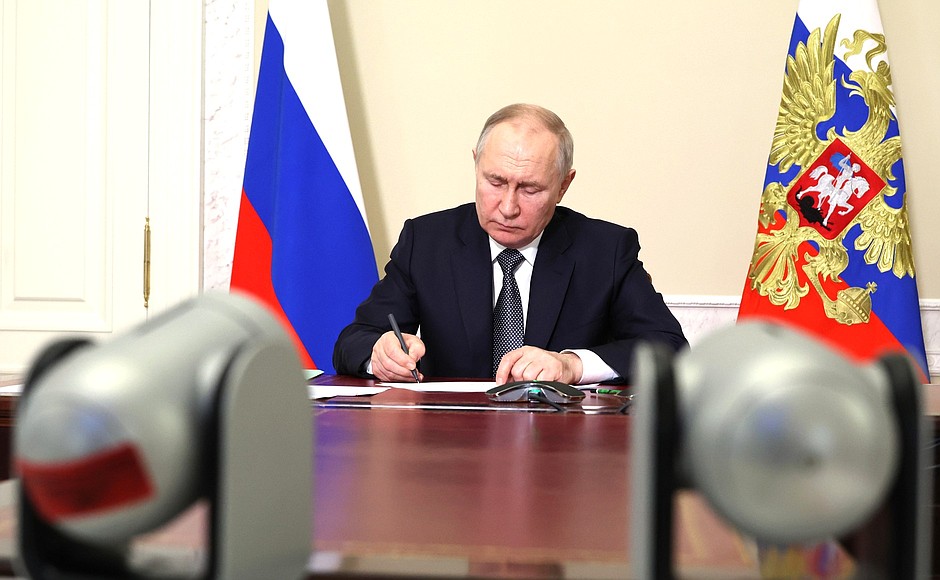
Vladimir Putin. Photo courtesy Kremlin.
Moscow/Brussels: Moscow today accused the Kyiv regime of trying to assassinate Russian President Vladimir Putin and warned that “Russia reserves the right to take countermeasures wherever and whenever it deems appropriate”.
The Presidential Press Service in its message issued at 14:35 (local time – 17:05 IST) claimed that Ukraine attempted a drone strike against the residence of the President of the Russian Federation at the Kremlin. Offering details, it said two unmanned aerial vehicles targeted the Kremlin.
It stated that President Putin has not suffered in this terrorist attack. His working schedule remains unchanged and follows its ordinary course.
“We view these actions as a planned terrorist attack and an assassination attempt targeting the President, carried out ahead of Victory Day and the May 9 Parade, where foreign guests are expected to be present, among others,” the message read.
Timely action by the military and special services involving radar systems enabled them to disable the devices. They crashed in the Kremlin grounds, scattering fragments without causing any casualties or damage, Russia claimed.
The deputy of the State Duma of the Russian Federation from Crimea, Mikhail Sheremet, in an interview with RIA, a Russian state-owned domestic news agency, called for an attack on Ukraine President Volodymyr Zelenskyy’s palace in Kyiv.
Moscow Mayor Sergei Sobyanin said that the city had introduced an immediate ban on unauthorised drone flights.
European Commission to ramp up supply of ammunition and missiles to Kyiv
Meanwhile, the European Commission today adopted the ‘Act in Support of Ammunition Production (ASAP)’ to urgently deliver ammunition and missiles to Ukraine and to help Member States refill their stocks.
By introducing targeted measures including financing, the Act aims at ramping up the European Union’s production capacity and addressing the current shortage of ammunition and missiles as well as their components. In particular, it will strengthen the responsiveness and ability of the Union defence industry to ensure the timely supply of ammunition and missiles in Europe.
“In light of the return of high-intensity conflict in Europe, the timely availability in sufficient volumes of these products is critical for our security and for our continuous efforts to support Ukraine,” a Commission’s press release stated today.
The Commission proposed to allocate a budget of €500 million in current prices. This budget comes from the redeployment of different instruments, in particular the European Defence Fund and the future EDIRPA. President of the European Commission, Ursula von der Leyen, said: “Ukraine is heroically resisting the brutal Russian invader. We stand by our promise to support Ukraine and its people, for as long as it takes. But Ukraine’s brave soldiers need sufficient military equipment to defend their country. Europe is stepping up its support on three tracks. First, Member States are delivering additional ammunition from their existing stocks, with new European Peace Facility support of 1 billion euros. Second, together with Member States, we will procure jointly more ammunition for Ukraine – and we are making available an additional billion euros for that. And today, we are delivering on the third track. Ramping up and speeding up the defence industrial production of ammunition in Europe.
This will help supply more ammunition for Kyiv to defend its citizens and it will also strengthen our European defence capabilities. Together with the Member States, we will mobilise a further 1 billion euros to ramp up capacities across Europe. This is a critical part of Europe‘s strategic capacity to defend its interests and values, and help maintain peace on our continent.”
The proposed Regulation comprises measures to support the industrial reinforcement of ammunition and missile production in the EU, including their input products. Financial support will be provided in the form of grants to various types of actions contributing to the efforts of the European defence industry to increase their production capacities and tackle identified bottlenecks. Financial support will be provided for actions contributing to:
- Optimising, expanding, modernising, upgrading or repurposing existing production capacities;
- Establishing new production capacities;
- Establishing cross-border industrial partnerships, including through public-private partnerships, aiming, for instance, at securing access to or reserving stocks of strategic components or raw materials;
- Building up and making available reserved surge manufacturing capacities;
- Testing or reconditioning (to address obsolescence) processes with a view to making existing ammunition and missiles useable;
- Reskilling and upskilling the related workforce.
In addition, the Act will facilitate access to finance for EU companies in the ammunition and missile field, potentially through a dedicated facility, the ‘Ramp-up Fund’. This fund would aim to support undertakings in the ammunition and missile supply chains to have access to both public and private financing, to speed up investments needed to increase manufacturing capacities.
Responding to the urgency of the situation, within 5 weeks of the agreement on the three-track approach in the Council of the European Union, the Commission adopted this proposal for a Regulation as a matter of high priority and will transmit it to the co-legislators.
The Commission stated it counts on a swift adoption, before the summer of 2023, to be able to initiate support for the ramping up of the EU’s defence industry production capacities of ammunition and missiles. The instrument will cease to apply in mid-2025.
It may be mentioned that on March 20, 2023, the European Council agreed on a three-track approach calling Member States to jointly procure ammunition and, if requested, missiles, to refill their stocks while enabling the continuation of support to Kyiv. As these joint efforts could only be effective if the EU supply side delivered on time the required defence products, the Council invited the Commission to present concrete proposals to urgently support the ramp-up of manufacturing capacities of the European defence industry, secure supply chains, facilitate efficient procurement procedures, address shortfalls in production capacities and promote investments, including, where appropriate, mobilising the EU budget.
“The three tracks are interlinked and will be pursued in parallel,” the Commission stated.
As pointed out by the Joint Communication on Defence Investment Gaps analysis and way forward, years of underinvestment in defence resulted in both capability and industrial gaps within the European Union. Moscow’s war of aggression against Kyiv contributed to a significant increase in global demand for specific defence products, notably ammunition and missiles, resulting in a discrepancy between production capacity and demand.
– global bihari bureau





